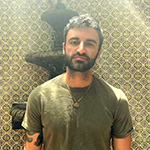Chrestomathy in Stainless Reduction
Here’s Pap, sweaty and slagged. Back home from another day on the floor, retrieving Grandma’s copy of Mastering the Art of French Cooking from the cupboard. His own aching back gives him as hard a time as the language on the pages. “If I’d have known a shallot was just a goddamn fancy onion, I would have pinched a fat one from Nick’s roadside stand rather than drive fifteen miles to the Giant Eagle in Cruikshank,” he says. Spare a thought for the teenaged employees at the Giant Eagle in Cruikshank. Stacking paper towels in the late afternoon, watching a pair of overalls covered in asbestos approach with an ingredients list for quiche Lorraine.
Fifty years of this: Grandma wakes up at 4 a.m. She makes them both breakfast before they leave for work—him at the steel mill, her at the injection clinic. He eats a pan-fried egg then packs his lunch—a ham sandwich, warmed over the arc furnace. “All these recipes up here,” Grandma says, touching her head. “All this talent.” Pap claims the world isn’t any less dangerous when it’s predictable, and change is like a cold breeze blowing through a cracked window. He insists their lives are hard enough without introducing little whirls into them. “Yes, yes, my darling. I understand,” Grandma says. In the evenings Pap presses her feet. Lets her be the patient for a change. He asks her, “left arm or right?”, and kisses the spot where she points. His appetite never wavers, for fried eggs or otherwise. I imagine him hunting the house for cracked windows, slamming shut the mouth of time.
What Death lacks in tenderness, it makes up for in courtesy. It takes Grandma by the hand. It escorts her to work, and when she can no longer work it keeps her company on the living room sofa. It shows up in X-rays, biopsies, and MRIs and says, “I just thought you’d might like to know that this is where I’m headed next.” Death helps her choose the best photos. The one where she and Pap are at the swim club as kids, and her hands are cupped, pouring water over his slick blonde locks. The one where he’s giving her a piggyback through the threshold of their house, her bridal gown cascading onto the empty wooden floor. Death helps assemble the album. When it is complete, Grandma gives it to Pap and says, “Remember it like this.” I imagine him confused at the transparency of Death’s work. Every day he wakes up and there Death is, in bed with him, breathing softly as the day before. Whispering good morning with a wounded voice. Good morning, Death, he thinks. Perhaps if I made you breakfast . . .
That album is on my lap now and I’m flipping, flipping. There’s a photo of Pap and Grandma dancing at the Lion’s Club for a church fundraiser. He’s dipping her impossibly low, verve bursting from the Kodachrome. There’s another one clipped from the local paper—she’s kissing his cheek outside the Giant Eagle in Cruikshank, and he’s dressed as Santa, ringing the bell for the Salvation Army. Here’s one of him alone, wearing work overalls outside his house, hands behind his back and smiling. Looking like borrowed peace.
I imagine Pap retired, pricing out trailers in the classifieds. Looking for something a few hammer swings away from a chicken coop. He cooks his own eggs now, after all. Scrambled, shirred, over easy—why pay for them anymore? Every Sunday he invites me over to try something new, something he wishes he’d have let Grandma try when he could. But more than anything I imagine him happy, covered in scale on his last day at the mill. Right before the rollers jammed and shot a white-hot cobble into his chest, into his wrought iron heart, a French omelet recipe sealed in his pocket. Finally free of change, Death, and this slaughterhouse country.
I flip to the last photo in the album. There’s Pap and Grandma, young again, sitting on the front stoop of their house at night. Snow shovels in hand. A stolen moment between digging out their cars for work the next day. His arm is around her and she’s tilting her head back, marveling at something right above them. The quiet, or the falling sky, or how the sky was accumulating ceaselessly beneath their feet. This is the coveted world. The one he sees when he closes his eyes, the storm in the gears building up behind him. Thinking about how nice the eggs poached in red wine were settling in his belly, right where they belonged. Returning to the stoop on that night, and how her breath felt so warm in the raw atmosphere. How eternity was big, but it had a shape he could just make out on the road. How, through his mittens and her coat and their layers and layers of sweaters, he could still feel her pulse humming in her waist, going on and on without end, like the gentle white earth unfolding all around them.

Dan Shields is from Middletown, Pennsylvania, home of the Three Mile Island nuclear meltdown of 1979. His work has appeared or is forthcoming in Cleaver, WAS, Sky Island, and others. Find him on Twitter @DanDotShields.

 BACK TO ISSUE
BACK TO ISSUE